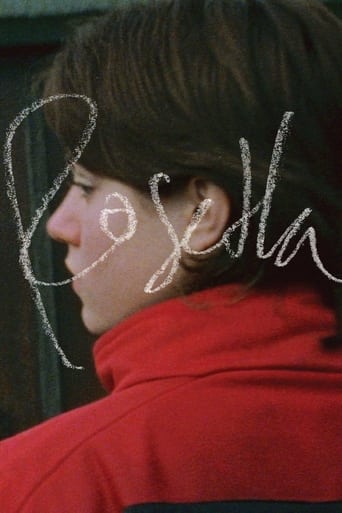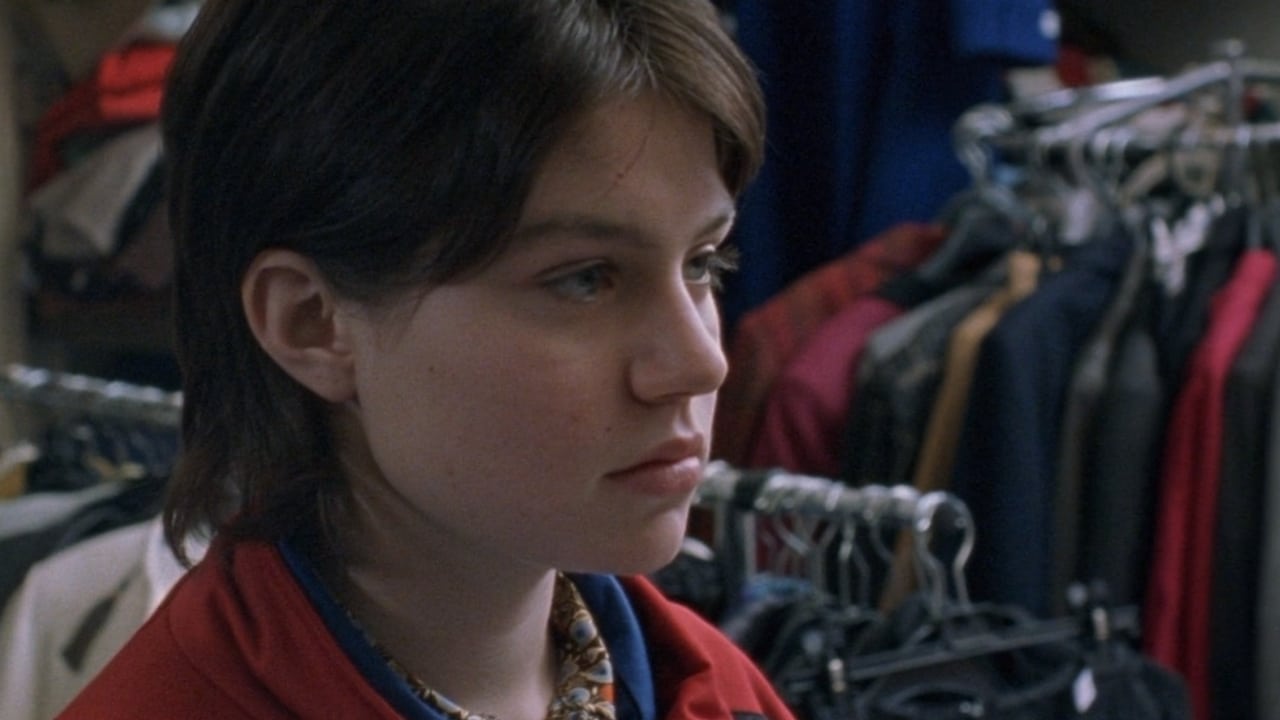sharky_55
Rosetta, like many of the Dardenne brother's films, opens in medias res, with a young girl confronting an employer about being fired. We are immediately aware of the before and after of these events, and can conclude that this is a regular occurrence for Rosetta, being exploited as cheap labour for a limited period of time, and having to make a loud disgrace of herself when told the unfortunate news. It's impact is so visceral that the film in fact has proved to be the catalyst for reform for youth workers in Belgium.Near home, we see her repeat the same actions over and over; crossing a four laned road, checking the fish traps, refilling her bottle, putting on and taking off her boots and exchanging them for her 'nice' shoes, go all over town in search of a job. These are not exciting in any sense, but you see how it weighs her down, having to return to these tasks over and over to ensure her survival. The Dardennes reused this technique in Two Days One Night, and repeatedly forced Sandra to walk up long pathways, inquire with numerous strangers, and knock and ask the same questions again and again, and build up a sense of dread that came with each refusal. As Rosetta trudges through this day to day cycle, and asks the same questions, we begin to realise that it is not only a matter of financial security, but also her own pride being wounded by every rejection. We see her utter dedication to leave this life even as she is so familiar and efficient in all its facets. Her mother is the opposing force to this; clearly in denial mental issues and whoring herself out for a drink or two. Rosetta hates her, and her mindset that seems so at peace with their destiny of living their lives out in a trailer park, but reacts with the same anger when her mother is clearly being taken advantage of: "My mother's not a whore!" Her last vestiges of pride (throwing food away and refusing to beg or resort to charity) and her tough exterior are eviscerated in one startling scene of vulnerability and emotional distress - while trying to wrestle with her mother and convince her to apply for rehab, she is accidentally pushed into the river. Her mother's immediate reaction is so damning and harsh: she flees like she flees the reality that Rosetta forces her to try and confront. And Rosetta herself, her gruff, defensive voice put on to shield her from any perception of weakness, becomes shrill and desperate as it calls for mommy, to no avail. She meets Riquet, a young waffle worker whom may be the first and only friend in her life. When he rides up to the trailer park, she is supremely embarrassed, but he does not show any signs of ill will or prejudice. He is in fact kind to her, and it is so unexpected for Rosetta that as she lays in his bed at night, she has to repeat to herself or risk falling asleep and never waking up to a 'better life'. She is numb and cold to his open and kind reception; when has this ever lead to something good in her life? And then, as he falls into the water as she once did, she hesitates because it might just open up a spot for her to take. This act is less convincing than revealing his side waffle business to the boss; because we do not see this sort of malice from her at all previously (the fighting at the beginning is more born of desperation), and it feels uncharacteristically cold, even for someone who is looking out for herself. But this lends power to Riquet's final action, because of this hint of hesitation - the Dardennes reverse it and for once in her life she finds a little spot of solace, of compassion, that is so genuinely honest and good, even as Rosetta has done all of those things to him. It is shot in the same way as all of the Dardenne's work, but perhaps because of the subject matter, it is an even more harrowing vision of the neo-realism aesthetic. Long takes and body language are used to depict the heightened senses of Rosetta and how they have been tuned as a result of this lifestyle and to ensure survival; as she picks up on stray dialogue in the background about money being left in a till, as her body stoops in resignation of having to help her drunk mother up again, and in a subtle moment, as she nervously glances off-screen briefly at Riquet, whom has come to the store to survey her in his old position. Sometimes, the physical shaking of the camera does get a bit excessive, and is relied upon rather than the actual desperation of the body and facial expressions. And like always, there is no music to speak of, no sentimental chorus or signalling of moment of change. Just a repeated mantra that is whispered to no one but herself, because if it is not reaffirmed, she may lose hope altogether.
Boba_Fett1138
Always hard to say something about these sort of movies, since they are being so simple in its setup and you can really hardly go wrong with these type of movies. And this one is good within its genre, though I can't say that it's being the most involving and interesting movie to watch.You could say that this movie is being like a random slice of life and it's following a young woman around, who is struggling to keep a steady job. There of course is a whole lot of other drama going on as well, also involving a romantic plot.In the end it also still is a movie that leaves more questions than answers. The movie isn't all about explaining everything to you and tells you what happens after certain events and perhaps more importantly; why. It's OK to feature such an approach, especially for a movie of this sort but in this case I would had preferred some more depth and explanations, to get me more involved with its story and characters.That was also a big problem for me; I just couldn't ever like or understand the movie its main character. She obviously has some kind of issues and is socially very awkward. Not really a likable person, you want to hang around with, which also makes her not all that great and involving to follow around, in my opinion.But still as these sort of movies go, I really can't call it a bad one. It never bores and it never drags at any point, though this is obviously a slower type of movie, in which not an awful lot is going on, all the time. It's perhaps not a very engaging movie but it still remains an interesting one, also mostly because it never really gets predictable.Certainly watchable, especially when you are into these type of movies.7/10 http://bobafett1138.blogspot.com/
tieman64
One time Palme d'Or winner, now forgotten, the Dardenne brothers' "Rosetta" stars Emilie Dequenne as Rosetta, a teenage girl trying to escape an alcoholic mother, her decaying trailer park (ironically titled "Grand Canyon", an abyss which sucks in an entire underclass) and her apparently dead-end existence. The film recalls Robert Bresson's "Mouchette", but is shot with fierce, angry hand-held camera work, which mirrors Rosetta's own bottled up rage and desperation. One passage, in which the seventeen year old Rosetta is virtually exploited by a company for cheap labour, led to Belgium changing several laws, banning employers from paying teenage workers less than the minimum wage. It's a tiny, condescending, almost insignificant real-life gesture, but the kind of little gestures which keep today's Rosettas alive nevertheless.The film isn't only about Rosetta's daily struggles for survival, but the blind eyed turned toward an entire stratum of society. Rosetta is a member of a socio-economic class which the world refuses to deal with, let alone acknowledge. Like a disease, she finds herself being pushed further and further out."Rosetta" is heavily influenced by Bresson's "Mouchette", another film which revolved around a marginalised girl who cares for a burdensome mother. And like Bresson, the Dardennes focus on their heroine's own private rituals: the taking off of muddy boots, the scrounging for and preparing of food, the tending to an alcoholic mother etc. And all the while, Rosetta's plotting: how do I escape this? What future will I be allowed? At the end of "Mouchette", Bresson's heroine seemed to resort to suicide, rolling into a muddy pond. The pond features in "Rosetta" as well, though here it is both a source of life and death. Rosetta goes to it for fish, for food, for escape, while later, when a friend falls inside it, she initially refuses to save him. After-all, with him dead, she can inherit his business and perhaps make some money. It is in her best interest to ignore him, to discard his body and turn away as society does to her. But of course she doesn't. She fishes him out. Unlike the world, she views him, if only for a moment, as a kindred spirit rather than a competitor.Still, suicide factors into "Rosetta" as well, for our hero does eventually regard it as her only mode of escape. Ironically, like Bresson's "The Devil Probably", she must pay for her own suicide. Even her death has been commodified. In this way, the film not only exposes the indifference of contemporary capitalism, in which economic disparities grow by the day, in which class has become a bigger distinction than nationality, language, religion etc, but highlights a certain impossibility of morality. Rosetta saves a life, but in doing so may have destroyed her own future.8/10 – Not as aesthetically strong as similar modern movies in its field ("Wendy and Lucy", "Mouchette", "Land of Plenty" etc), or the Italian neo-realist, British kitchen-sink and French new-wave films which inspire it. Worth one viewing.
Buff
Like in Dardenne brothers films, in this one we witness how the main character makes a mistake because of hardships of life or because he/she is naive, then realizes the mistake and corrects it, eventually doing the right thing. No frills, no drama, yet so moving. When we watch this whole process with the kind of fantastic and unconventional closeness - the engrossing & realistic Dardenne-style of close up shots - we actually fall in love and sympathize with the main character - the girl Rosetta. This isn't a sad movie at all (like some people have commented), its a lovely movie that celebrates the spirit of being a normal human being, a must see for any cinema buff. Unlike ambiguous Hollywood films, Dardenne movies are simple and focused, the audience precisely and naturally sees what the directors want to say.


 AD
AD




